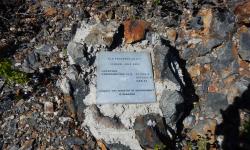Eagle Plains Confirms High-Grade Gold Mineralization at Pine Channel Project, Saskatchewan
Saskatchewan | July 29, 2019Cranbrook, B.C., July 29, 2019: Eagle Plains Resources Ltd. (TSX-V:EPL) (“EPL” or “Eagle Plains”) has received rock geochemical results from an inaugural 2019 field program conducted recently on its 100%-owned Pine Channel project located on Lake Athabasca, 43 km west of Stoney Rapids, SK. The 7,000 ha property is owned 100% by Eagle Plains and is considered to have significant potential to host orogenic gold mineralization.
The objective of the 2019 program was to evaluate and confirm the nature of mineralization previously documented at historical showings. Limited drilling has been completed in and around the property area by past operators, which resulted in the successful delineation of mineralization to shallow depths. Potential to test for further continuity at depth is considered to be excellent. A total of 25 rock samples were collected in mid-June and returned values ranging from 7 ppb Au up to a maximum of 77.5 g/t (2.73 oz/T) Au.
2019 Exploration Highlights
Occurrence #9
The Occurrence No. 9 Au Showing includes three gold-bearing quartz veins (Main Vein, Rob Au Showing and AC Au Vein) hosted within metamorphosed intrusive rocks (SMDI 2175). The Main Vein consists of a 200 m long, 0.1-2.5 m wide north-south striking vertical vein that crosscuts the quartz-pyrite-arsenopyrite AC and Rob Veins. Quartz vein-hosted mineralization consists of veinlets and lenses of arsenopyrite, pyrite, pyrrhotite, and minor chalcopyrite with gold generally associated with semi-massive arsenopyrite mineralization. 2019 results included grab samples of blue grey quartz with arsenopyrite collected from the Main Vein area which returned 7.1 g/t Au (CDPCR005) and 6.9 g/t Au (CDPCR006).
North Norite Bay
The North Norite Bay Au Showing is a northwest-striking, steeply northeast-dipping quartz-filled shear zone (SMDI 2183). The veins are up to 0.6 m wide and have been traced for a strike length of 375 m. The quartz veins and surrounding sheared host rocks contain up to 10% combined pyrite and arsenopyrite. Twelve historical AX drill holes have tested the mineralized shear zone. The best intercept was 0.5 m grading 407.96 g/t (14.39 oz/T) Au in GT88-11. 2019 results include CDPCR007, a 1.84 kilogram composite of trench rubble consisting of white to blue grey quartz with pyrite and arsenopyrite which returned 77.5 g/t Au.
ELA Shaft Area
The ELA Au showing (SMDI 1574) is a northwest-striking, steeply southwest-dipping to vertical quartz vein mineralized with arsenopyrite, pyrite, and minor chalcopyrite disseminations. The vein varies in width from 1.2-4.0 m, occurs over a strike length of over 200 m and is open along strike. Historical trench results include 6.82 g/t Au, 8.68 g/t Ag over 7.6 m, 7.44 g/t Au, 13.02 g/t Ag over 0.95 m, 17.36 g/t Au over 2.0 m, 13.64 g/t Au over 1.9 m, 45.26 g/t Au over 3.0 m, and 16.74 g/t Au over 1.5 m. Twelve NQ drill holes were completed in 1987, tracing the mineralized vein to a depth of 38 m with highlights including 24.52 g/t Au from 40.35 to 40.87 m in hole 87-07 and 5.27 g/t Au from 23.40-25.15 m in hole 87-11. 2019 results include:
| SAMPLE NUMBER | DESCRIPTION | Au g/t |
|---|---|---|
| CDPCR013 | 2.39 kg composite of quartz / arsenopyrite float main trench area | 13.6 |
| CDPCR014 | 2.71 kg composite of quartz / arsenopyrite float main trench area | 45.1 |
| CDPCR015 | 1.3m cm chip across trench bottom; vuggy quartz with arsenopyrite | 28.1 |
| CDPCR016 | 25cm chip across trench bottom; vuggy quartz with arsenopyrite | 7.4 |
| DKPCR003 | 5.17 kg composite of quartz / arsenopyrite float north trench area | 16.6 |
| DKPCR004 | 4.9 kg composite of quartz / arsenopyrite float north trench area | 13.4 |
| DKPCR006 | grab from 1m wide rusty quartz vein | 22.2 |
Property Geology and History
The Pine Channel property covers fifteen SMDI mineral occurrences of gold-bearing quartz veins in fractures hosted by graphitic schists and gneisses. The fracture zones vary from 0.1 – 2.0 m in width and the quartz veins typically are associated with arsenopyrite, tourmaline, jamesonite, pyrrhotite, chalcopyrite, galena and sphalerite.
The first recorded work on the Pine Channel property was in 1950 by Goldfields Uranium Mines. The first significant program on the property was in 1980 by Golden Rule Resources who completed 246 line km of airborne EM (INPUT) and magnetic surveying. Follow-up ground work located 11 significant occurrences. From 1985-1988 Colchis Resources completed VLF-EM geophysics, biogeochemical surveys, prospecting, soil sampling and trenching followed by shallow diamond drill testing of selected targets. Part of the property was covered by an airborne VTEM survey in 2013. Approximately 90 diamond drill holes have been completed on the property. Most of the holes were relatively shallow (~<100 m) using small diameter (AX) core, which is poorly suited to sampling the high grade, nuggety gold mineralization present in the Pine Channel area.
Highlights from historical work include:
- North Norite Bay (SMDI 2183): 407.96 g/t (14.39 oz/T) Au over 0.5 m (drill hole)
- ELA (SMDI 1574): 39.96 g/t (1.41 oz/t) Au over 0.55 m (drill hole)
- Holes G-1 and G-3 (SMDI 2329): 3.20 g/t Au over 1 m (drill hole)
- Occurrence No. 6/Occurrence No. 8 (SMDI 1581): 90.6 g/t (3.20 oz/T) Au over 0.2 m (trench)
- Cole Lake Ni-Cu (SMDI 1583): 0.45% Ni over 7.0 m (drill hole), 6.2 g/t Au, 0.01% Ni and 0.06% Cu over 3.0 m (trench)
- King/Cole South (SMDI 2177): 31.93 g/t Ag, 1.55% Pb, 0.44% Zn over 0.28 m (drill hole)
Management cautions that historical results were collected and reported by past operators and have not been verified nor confirmed by management, but form a basis for ongoing work in the Pine Channel property area.
Charles C. Downie, P.Geo., a “qualified person” for the purposes of National Instrument 43-101 - Standards of Disclosure for Mineral Projects and a Director of Eagle Plains Resources Ltd., has prepared, reviewed, and approved the scientific and technical disclosure in this news release.
About Eagle Plains Resources
Based in Cranbrook, B.C., Eagle Plains continues to conduct research, acquire and explore mineral projects throughout western Canada. The Company is committed to steadily enhancing shareholder value by advancing our diverse portfolio of projects toward discovery through collaborative partnerships and development of a highly experienced technical team. Managements’ current focus is to preserve its treasury while advancing its most promising exploration projects. In addition, Eagle Plains continues to seek out and secure high-quality, unencumbered projects through research, staking and strategic acquisitions. Since 2012, Eagle Plains has added to its portfolio a number of new projects exceeding 130,000 ha targeting mainly gold, uranium and base-metals in Saskatchewan, a highly-prospective mining jurisdiction which was recently recognized by the Fraser Institute as the second best place in the world in terms of Investment Attractiveness. Throughout the exploration process, our mission is to help maintain prosperous communities by exploring for and discovering resource opportunities while building lasting relationships through honest and respectful business practices.
Expenditures from 2011-2018 on Eagle Plains-related projects exceed $20M, most of which was funded by third-party partners. This exploration work resulted in approximately 30,000 m of diamond-drilling and extensive ground-based exploration work facilitating the advancement of numerous projects at various stages of development.
On behalf of the Board of Directors
“Tim J. Termuende”
President and CEO
For further information on EPL, please contact Mike Labach at 1 866 HUNT ORE (486 8673)
Email: mgl@eagleplains.com or visit our website at https://www.eagleplains.com
Cautionary Note Regarding Forward-Looking Statements
Neither the TSX Venture Exchange nor its Regulation Services Provider (as that term is defined in the policies of the TSX Venture Exchange) accepts responsibility for the adequacy or accuracy of this release. This news release may contain forward-looking statements including but not limited to comments regarding the timing and content of upcoming work programs, geological interpretations, receipt of property titles, potential mineral recovery processes, etc. Forward-looking statements address future events and conditions and therefore, involve inherent risks and uncertainties. Actual results may differ materially from those currently anticipated in such statements.
Related Projects
Latest News Releases
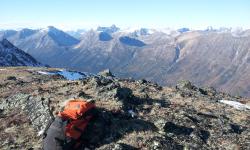
Eagle Plains and Sun Summit Minerals Execute Option Agreement for the Theory Copper-Gold Project, British Columbia

Eagle Plains and Earthwise Minerals Execute Option Agreement for the Iron Range Gold Project, British Columbia
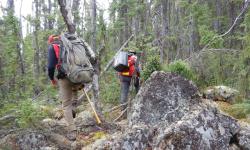
Eagle Plains and Partner Refined Energy Receive Permit for Drilling at Dufferin West Uranium Property, Saskatchewan
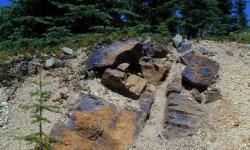
Eagle Plains Announces Letter of Intent with Earthwise Minerals for Option of the Iron Range Project, British Columbia
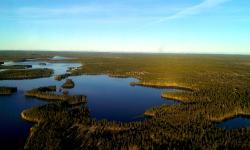
Eagle Plains Partner Xcite Resources Reports Results From Fieldwork at the Uranium City Area Projects, Saskatchewan

